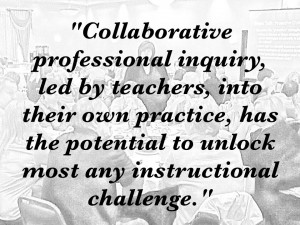Photo in courtesy of https://www.flickr.com/photos/7815007@N07/13983341233/in/photostream/
Professional development (Pro-D) is a “must do” for educators. It is important that we, educators, keep ourselves inline with the changing world, the changing curriculum, the changing pedagogy and any current educational issues. There are approximately six Pro-D days scheduled in the school year, to provide learning opportunities to educators. Teachers might attend a workshop, or do a self-directed Pro-D activity such as working on an action research, or reading academic articles, etc. Pro-D became a passive experience, and the effectiveness is questionable. Please do not get me wrong, I am not saying that attending a workshop or doing self-directed Pro-D activity individually are not effective. If the topic and issue addressed in workshop or self-directed Pro-D fits your need or the challenges that you are facing, it is worthwhile. However, I do not believe that “one size fits all” when it comes to Pro-D. Students’ learning is our ultimate goal, and I think it should be the drive of educators’ Pro-D so that our Pro-D is more practical and worthwhile. I hope to find a Pro-D format that is customized to the needs of any particular educator, or school community. When I came across “collaborative teachers inquiry,” it seems to be able to do the trick.
I like the answer of one of the interviewed teachers in the video: Why not? Why not give this new Pro-D format a try? As we encourage our students to learn collaboratively through inquiry, why not we do it ourselves? With a first-handed experience of collaborative inquiry, teachers will be able to understand and facilitate collaborative inquiry among his/her students.
My final project is to create a video to “promote” collaborative inquiry as an in-school Pro-D format. Up to date, I have decided the following contents of the video:
- Why should we do collaborative inquiry? (This would be my rationale as above)
- Using Edcamp as a reference, explain what the schedule of a collaborative inquiry Pro-D day would looks like.
- Suggest follow-up event(s) after the Pro-D day, for example, after school gatherings for updates.
My original plan is to advocate collaborative inquiry to colleagues. However, during my planning process, I thought the video could be designed for a broader range of audiences. As we always encourage students to learn and inquiry collaboratively, if I change content #1 from explaining my rationale to explaining collaborative inquiry and its benefits in general, the video could be used for students, or even parents advisory committee (PAC) to address concerns in school community. But if I do so, my project’s goal will become advocating collaborative inquiry in general, rather than aiming to make a change in our Pro-D practice. What should I do? Should I, or should I not make such a change in content? Please help, my PLN’s colleagues!
References:
Marcinek, Andrew. “Edcamps: Remixing Professional Development.” Eutopia. 19 Mar. 2014. Web. 20 Nov. 2015. <http://www.edutopia.org/blog/edcamps-remixing-profesional-development-andrew-marcinek>.
“System Leaders and Collaborative Inquiry.” Capacity Building K-12 (2015). Queen’s Printer for Ontario. Web. 20 Nov. 2015.
Link: http://www.edu.gov.on.ca/eng/literacynumeracy/inspire/research/CBS_SystemLeaders.pdf

